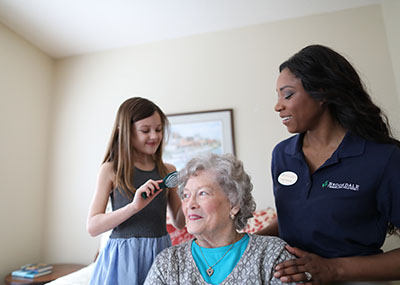- Home
- Brookdale Life
- Brookdale Blogs
- 5 Ways to Maintain Your Memory
About 5.7 million Americans live with Alzheimer’s Disease and that number is growing. However, research indicates that one in three cases could potentially be slowed down or even prevented. And there are a few ways to combat memory loss in general. Taking preventative action now may be able to help you in the future. Here we have listed five easy things that studies suggest can help you to keep your brain sharp, your wits intact and keep memory loss at bay:
Eat Smart
According to Harvard Health, “Diets high in cholesterol and fat might speed up the formation of beta-amyloid plaques in the brain.” Meaning, while you eat steak and saturated fats, these sticky proteins can cause cognitive changes. Not to mention, there has been some research that positively links high cholesterol diets and Alzheimer’s. So be wary before plating up that second serving of bacon.
But it’s not all bad news for carnivores. There’s an easy answer to your meat cravings: become a pescatarian. Fish not only enhances your memory and cognitive longevity, it tastes pretty good too. As a major component of the Mediterranean diet, you can never go wrong with this food source from the sea.
Other foods for thought: Blueberries, broccoli, pumpkin seeds, almonds, yogurt, chocolate, oranges and eggs.
Stay Curious
Learning, experiencing new things, exploring, reading and playing games never goes out of style. And when you exercise your brain as if it were a muscle, then you are not only sharpening your wits now, but also preparing your mind for the future.
Taking courses and participating in challenging activities like puzzles and card games are easy ways to stay sharp, but reading might be the best method for memory preservation. According to a study conducted over a six-year period, seniors who read avidly reduced their memory decline by 30 percent. Go ahead and fire up that eReader or get to the library. It’s time to dive into some good, old-fashioned literature.
Meditate
Meditation doesn’t only potentially result in longevity, and it’s not just a way to relax and reflect. It’s been proven to increase gray matter in the brain. Which means it can significantly reduce age-related memory loss. But some meditations may be better than others when it comes to memory preservation — mantras and chants accompanied by repetitive physical motions are known to provide memory fortification.
Make sure to do your research or find a guide in order to help you meditate. Also, meditation can feel a bit awkward at first, but if you go slow and get in a routine, you’ll be able to feel the difference in a huge way.
Be Social
Relationships are so incredibly important. They help us stay engaged, present, fulfilled and loved. They also help our brains. When you’re a part of a community, organization or close-knit group of friends, you may be less likely to develop dementia. Studies have confirmed that loneliness increases the risk of dementia.
Keeping social ties, staying connected with old friends and calling your family members to invite them over for a bite, this is what life is all about and a great way to practice preventative health for your brain. So, stay close to the ones you love because they’re the ones helping keep you tethered to a happy, mindful existence, the ones who help keep you on your toes and the ones who help keep your mind sharp.
Sleep
It’s no surprise that memory retention and sleep are correlated. But just how important is sleep to our minds? According to the Division of Sleep Medicine at Harvard Medical School, memory consolidation takes place when we are asleep by strengthening neural connections. Therefore, if we don’t sleep well or sleep less than we should, we are at risk of missing those very important moments of memory formation and collection. As an older adult, 7-8 hours is the recommended amount of time you should be sleeping at night, giving you enough space to get deep into REM, and store those precious memories.
These are some of the most basic actions we can take to help our brains be as healthy as possible. For more information on finding a supportive community, and learning about our approach to person centered memory care, visit here. We’d love for you to take a look around.
The above content is shared for educational purposes only. You must consult your doctor before acting on any content on this website, especially if you have a medical condition. The content is not intended to be a substitute for professional medical advice, diagnosis, or treatment. Never disregard professional medical advice or delay in seeking it because of something you have read on our site.
Categories
- Alzheimer's & Dementia
- Caregiver's Corner
- Health, Safety and Wellness
- Financial Well-Being
- Passion & Purpose
- The Journey to Senior Living
- Trending Now
- Socialization & Relationships
- Brookdale Solutions
- Brookdale Vision and Growth
- Chronic Conditions
Archives
View All
- February 2026
- January 2026
- December 2025
- November 2025
- October 2025
- September 2025
- August 2025
- July 2025
- June 2025
- May 2025
- April 2025
- March 2025
Inside Brookdale Communities
See what’s happening on our community Instagram pages
Brookdale has communities near you!


